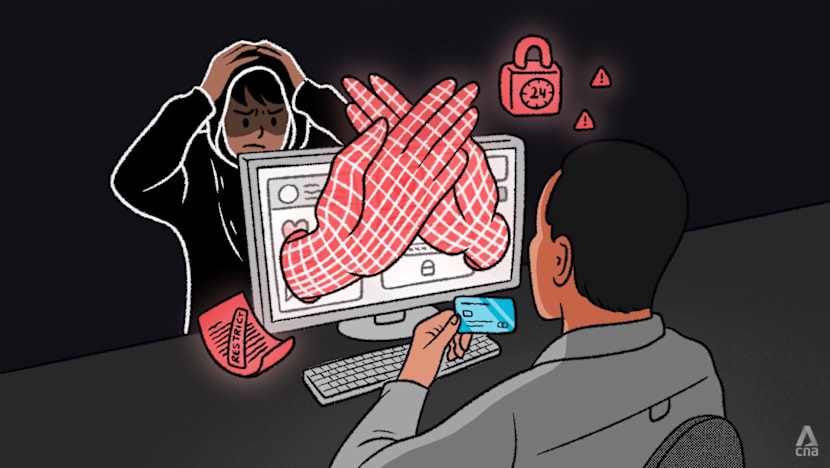Business
Singapore Banks Tighten Controls to Combat Rising Scams

In response to a surge in scams, Singaporean authorities and banks have implemented stricter controls over customer accounts. This initiative stems from a sharp increase in fraudulent activities, with residents reportedly losing a staggering S$456.4 million to scams in the first half of 2023 alone. The recent measures aim to strike a balance between consumer protection and personal autonomy in managing finances.
Kenneth Lee, a 29-year-old marketing professional, fell victim to a fraudulent investment scheme that cost him nearly S$165,000, his entire life savings. Lee initially invested smaller amounts, but as he observed purported profits, he was lured into transferring larger sums. After two months, the investment group vanished, taking his money with it. “If the bank had just called me or paused any of the transfers, I’d have been super grateful,” Lee remarked, acknowledging the necessity of increased protections against such scams. Yet, he also noted that these measures could lead to unintended consequences for legitimate transactions.
Consumer feedback on the new safeguards is mixed. While some, like Lee, appreciate the added protection, others feel that the measures may be overly cautious. Individuals have raised concerns about transaction delays and restrictions that can disrupt urgent transfers. Rain Tan, a civil servant, expressed frustration over the limitations imposed on transferring large sums between banks, stating, “It’s almost impossible for me to switch banks easily after my fixed deposit expires.”
The response from authorities follows extensive public consultations and is perceived as a necessary action to counteract a growing threat. Scams have consistently ranked among the top crimes in Singapore over recent years, with the government launching initiatives to hold financial institutions accountable for protecting customers from fraud.
In January, the Protection from Scams Bill was passed, granting police the authority to restrict banking transactions of potential scam victims. These restrictions, which can last up to 30 days, temporarily suspend money transfers and automated teller machine access while allowing individuals to access funds for essential living expenses. Additionally, banks are now empowered to hold transactions from accounts with balances exceeding S$50,000 if withdrawals surpass half of the total funds within a 24-hour period.
Banks have emphasized the necessity of these measures to keep pace with evolving scam tactics. Sukhvinder Singh, head of digital banking at Maybank Singapore, noted that before the new laws, staff often felt constrained from intervening when they suspected fraudulent activity. He described encounters with customers who were adamant about their transactions, stating, “These experiences were incredibly challenging because the bank had limited legal grounds to delay or stop a transaction without the customer’s consent.”
Despite the implementation of these measures, some customers continue to resist the changes. Raymond See, a member of DBS’s Anti-Scam team, reported that even with new regulations, customers often push back against transaction holds, emphasizing the importance of prioritizing customer safety. “Our goal is to save as much of the customer’s money as possible,” he said, highlighting that many people do eventually cancel transactions upon realizing they have been scammed.
While the measures aim to protect consumers, they have sparked debate about the extent of control banks and authorities should have over personal finances. Critics argue that such powers may infringe upon individual autonomy. Associate Professor Hannah Yee-Fen Lim from Nanyang Technological University pointed out that while the consultations raised awareness, many consumers remain unaware of the specifics of the measures being implemented.
Concerns about potential overreach echo sentiments in other countries, such as Thailand, where account freezes have drawn public backlash. In Singapore, some Members of Parliament have voiced similar apprehensions. Gerald Giam, a Workers’ Party MP, expressed that while the Bill is a crucial step in combating scams, it alters the legal relationship between banks and customers.
Debate continues over whether these interventions infringe on personal agency or serve as necessary precautions in an increasingly digital financial landscape. Experts emphasize the need for a balanced approach that protects vulnerable individuals without imposing undue restrictions on legitimate transactions.
As Singapore grapples with the complexities of financial regulation, the conversation surrounding these measures remains critical. Experts assert that protecting individuals from scams is a societal responsibility, necessitating a collective effort to foster digital resilience. Gabriel Tan, who leads a social enterprise focused on scam awareness, stressed the importance of education and awareness across all demographics, highlighting that scams can affect anyone, not just the elderly or naive.
In conclusion, while the new safeguards may introduce more friction in banking, they are intended to protect consumers amid a rapidly changing digital landscape. As the authorities continue to refine these measures, the challenge remains to find a balance between necessary protections and maintaining the convenience of personal financial management.
-

 World5 months ago
World5 months agoSouth Korea’s Foreign Minister Cho Hyun to Visit China This Week
-

 Business5 months ago
Business5 months agoStarling Bank Plans Secondary Share Sale, Targeting $5.4 Billion Valuation
-

 Top Stories5 months ago
Top Stories5 months agoMunsang College Celebrates 100 Years with Grand Ceremony
-

 World5 months ago
World5 months agoPAS Aims to Expand Parliamentary Influence in Upcoming Election
-

 Business7 months ago
Business7 months agoKenvue Dismisses CEO Thibaut Mongon as Strategic Review Advances
-

 Lifestyle6 months ago
Lifestyle6 months agoHumanism Camp Engages 250 Youths in Summer Fest 2025
-

 Sports6 months ago
Sports6 months agoDe Minaur Triumphs at Washington Open After Thrilling Comeback
-

 Sports7 months ago
Sports7 months agoTupou and Daugunu Join First Nations Squad for Lions Clash
-

 Top Stories7 months ago
Top Stories7 months agoColombian Senator Miguel Uribe Shows Signs of Recovery After Attack
-

 World7 months ago
World7 months agoASEAN Gears Up for Historic Joint Meeting of Foreign and Economic Ministers
-

 Health6 months ago
Health6 months agoNew Study Challenges Assumptions About Aging and Inflammation
-

 Business7 months ago
Business7 months agoOil Prices Surge Following New EU Sanctions on Russia









